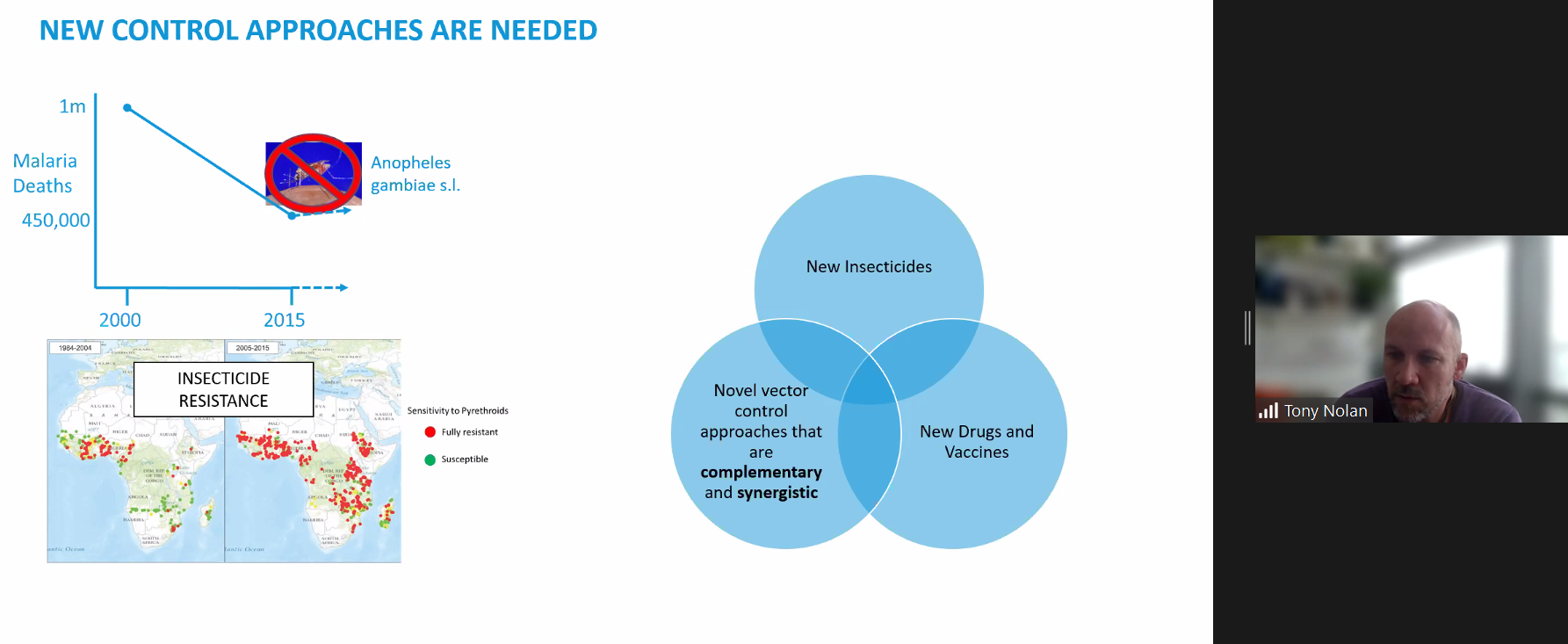By Dr. Amelie Wamba, Coordinator of the Gene Drive Project, Pan-African Mosquito Control Association (PAMCA)
The Pan-African Mosquito Control Association (PAMCA) and the Outreach Network for Gene Drive Research recently hosted the first of three webinars, as part of the Gene Drive Webinar Series. I had the pleasure of moderating this session called ”What is gene drive?”, which gathered over 100 participants and provided participants with an introduction to gene drive tools and their potential benefits and challenges.
 Dr. Tony Nolan, Liverpool School for Tropical Medicine, explaining why novel vector control approaches are needed.
Dr. Tony Nolan, Liverpool School for Tropical Medicine, explaining why novel vector control approaches are needed.
The event began with opening remarks by the host Dr. Emma Orefuwa, co-founder of PAMCA. Dr. Fredros Okumu, Ifakara Health Institute, then took the floor to provide a definition of gene drives, explaining the differences between natural and synthetic drives as well as the applications currently being explored. Dr. Okumu also explored the advantages of using gene drives – such as precision targeting, cost-effectiveness, and scalability – and addressed important issues from ethical and regulatory perspectives.
Dr. Tony Nolan, Liverpool School for Tropical Medicine, came next to further explain the science behind gene drive tools and contextualise their development. He clarified the differences between genetic control, genetic alteration, and gene drives, and compared gene drives to other available genetic approaches. By presenting an overview of studies on various mosquito-control interventions, Dr. Nolan helped participants understand the need to support gene drive research until they are considered effective and safe. Drug and insecticide resistance is just one challenge gene drive tools can potentially help us overcome.
For me, the key takeaway of the session is that no single technology is a magic bullet. We will need a combination of complementary tools to eliminate vector-borne diseases such as malaria. Another takeaway is that gene drives will need to be adapted to the context of each target community as what works in one will not necessarily work in another. Building capacity among African researchers and policymakers is key to helping them understand and benefit from innovative technologies such as gene drives, and to lay the necessary groundwork for the safe implementation of those technologies.
It was a pleasure to moderate this session which provided a technical overview of how gene drive technology works and explored the value of gene drive research. Through this webinar series, our hope is to contribute to an informed debate about gene drive. We will meet again in December to discuss potential gene drive applications to address global health and biodiversity challenges. In March 2024, it will be time to examine the regulatory and governance considerations for gene drive research. I hope to see you in our upcoming webinars, and don’t forget to join our membership database if you are interested in gene drive technologies and want to be part of the conversation going forward.
